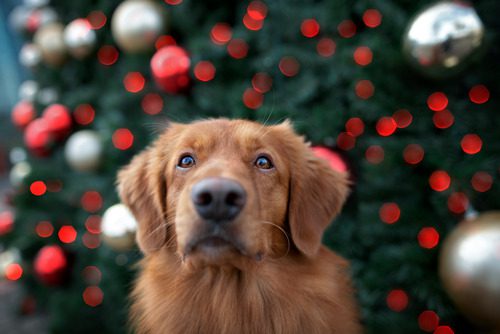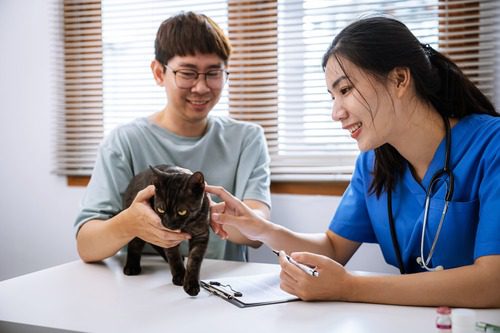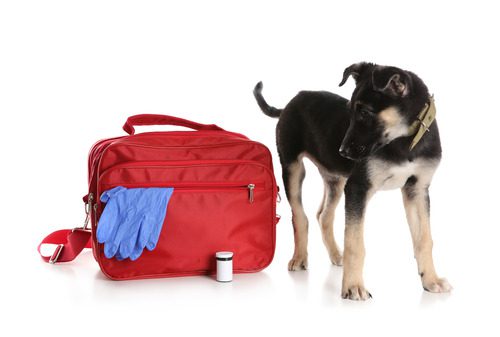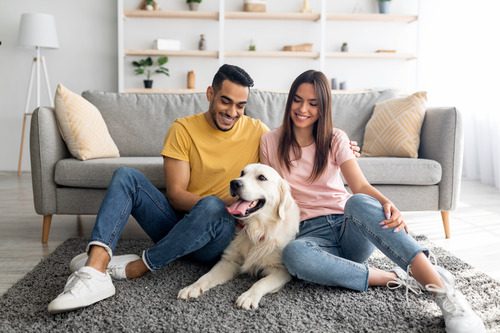Are Christmas Trees Toxic to Dogs?
The holiday season is a time of joy, decorations, and family gatherings. However, for dog owners, it also raises a critical question: Are Christmas trees toxic to dogs? When you’re decorating for the holidays this year, consider any potential risks and the safety measures you’ll need to put in place to ensure a festive and safe holiday for your furry friend.

Types of Christmas Trees and Their Potential Risks
Real Christmas Trees
Real Christmas trees, such as pine, fir, and spruce, are popular choices for holiday decorations. However, the needles from real trees can be sharp and potentially cause gastrointestinal issues if ingested. Additionally, the water used to keep the tree fresh may contain fertilizers, pesticides, or other chemicals that can be harmful to dogs if consumed.
Pine Needle Dangers
While the needles themselves are not typically toxic, the physical danger they pose should not be underestimated. Ingesting sharp needles can lead to punctures in the digestive tract, causing pain and possible infection.Monitor your dog around real Christmas trees and ensure they do not chew or swallow the needles.
Artificial Christmas Trees
Artificial Christmas trees, made from materials like PVC or polyethylene, do not have the same risk of needle ingestion as real trees. However, they still pose potential hazards. Dogs may chew on the plastic branches or decorations, which can lead to gastrointestinal blockages or choking hazards. The materials used in artificial trees may also contain harmful chemicals, particularly if the tree is old or has been improperly stored.
Protecting Your Pet This Christmas
To minimize risks, ensure your artificial tree is in good condition and free from loose parts that your dog might swallow. Additionally, choose decorations that are dog-safe and avoid using small, easily swallowed items.
Common Christmas Tree Decorations and Their Hazards
While Christmas decorations can create a jolly atmosphere, they can also pose additional risks to your pets.
Tinsel and Garland
If ingested, tinsel can cause severe intestinal blockages, requiring emergency surgery. Garland, depending on the material, can also pose choking hazards or cause digestive issues if chewed and swallowed. It’s best to avoid using these decorations if you have a curious dog at home.
Ornaments
Ornaments can be attractive to dogs, especially those that resemble toys or food. Glass ornaments can shatter and cause cuts, while plastic or metal ones can be chewed and ingested, leading to choking or gastrointestinal problems. Consider placing ornaments higher up on the tree, out of your dog’s reach, or use shatterproof decorations.
Lights and Electrical Cords
Twinkling lights add a festive touch to any Christmas tree, but they also introduce risks. Dogs may chew on electrical cords, leading to burns, electric shocks, or even fires. Secure cords and lights out of your dog’s reach, and consider using cord protectors or deterrent sprays to prevent chewing.
What Are Symptoms of Christmas Tree-Related Toxicity or Injury?
Here are some notable symptoms of Christmas tree toxicity or injury:
Gastrointestinal Distress
If your dog has ingested parts of a Christmas tree or decorations, they may exhibit symptoms such as vomiting, diarrhea, or a decreased appetite. Gastrointestinal distress is a common sign that your dog has eaten something they shouldn’t have. Monitor your dog closely for these symptoms, especially during the holiday season.
Behavioral Changes
Ingesting toxic substances or sustaining injuries from Christmas trees can lead to behavioral changes in dogs. They may become lethargic, show signs of pain, or become more irritable. Any sudden change in behavior warrants a visit to the vet to rule out potential toxicity or injury.
Visible Injuries
If your dog has cuts or punctures in their mouth, paws, or elsewhere, it may be a result of chewing on tree needles or broken ornaments. Visible injuries should be addressed promptly to prevent infection and ensure proper healing.
Preventative Measures to Protect Your Dog
Check out these tips to protect your dog from any holiday mishaps:
- Secure Your Tree: Securely anchor your Christmas tree to prevent it from toppling over if your dog bumps into it or tries to climb it. A sturdy tree stand and, if necessary, additional support from the ceiling or wall can keep your tree upright and your dog safe.
- Choose Dog-Safe Decorations: Opt for decorations that are less likely to break or be swallowed by your dog. Soft, fabric-based ornaments, large non-toxic decorations, and avoiding small, shiny items can help reduce the risk of injury or ingestion. Additionally, consider using natural, dog-safe decorations like pine cones or wooden ornaments.
- Create a Barrier: Setting up a physical barrier around your Christmas tree can help keep your dog away from potential hazards. Baby gates or exercise pens can effectively create a safe zone around the tree, preventing your dog from getting too close.
What to Do If Your Dog Shows Symptoms of Toxicity or Injury
If you suspect your dog has ingested something harmful or is showing signs of injury, contact your veterinarian at Cornerstone Veterinary Hospital of Clifton Park immediately. Provide details about what your dog might have eaten or the symptoms they are exhibiting and follow these steps.
Monitor Your Dog Closely
While waiting for veterinary advice, keep a close eye on your dog. Note any changes in behavior, appetite, or physical condition. If your veterinarian advises bringing your dog in for an examination, follow their instructions carefully.
Avoid Inducing Vomiting Without Guidance
In some cases, inducing vomiting may be necessary, but it should only be done under the guidance of a veterinarian. Certain substances can cause more harm if vomited back up, so always seek professional advice before taking any action.
By choosing appropriate decorations, securing your Christmas tree, and monitoring your pet closely, you can minimize potential hazards to ensure you and your pet have a safe and happy holiday season. For any questions or if your dog shows symptoms of toxicity or injury, please call Cornerstone Veterinary Hospital of Clifton Park at (518) 383-6254. Our team is here to provide the support and care your pet requires.
Recent Posts
Preparing Your Pet for the Vet
Preparing Your Pet for the Vet Taking your pet to the veterinarian can be a stress-filled experience…
Emergency Pet Checklist: Everything You Need to Know
Emergency Pet Checklist: Everything You Need to Know When unexpected emergencies strike, having a well-prepared plan can…
How to Pet Proof Your Home
How to Pet Proof Your Home Creating a safe and welcoming environment for your pets at home…
About Us
Originally opened as Animal Care Hospital by Dr. Mark Johnston in 1989, the hospital became Cornerstone Veterinary Hospital in 2015 when it was purchased by Drs. Alan and Lisa Knott. The name 'Cornerstone' holds a special place in their hearts, representing not only their Christian faith but also their commitment to being the cornerstone of the community in which they practice. As a family-owned and operated practice, every pet is treated as part of the family, ensuring they receive the highest standard of care. The team at Cornerstone Veterinary Hospital is dedicated to building lasting relationships with clients and their beloved pets, striving to be the cornerstone of the community in which they practice.



